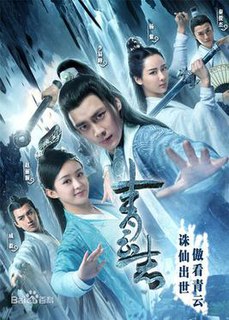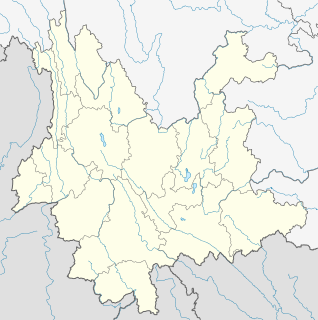
Traditional Chinese opera, or Xiqu, is a form of musical theatre in China with roots going back to the early periods in China. It is an amalgamation of various art forms that existed in ancient China, and evolved gradually over more than a thousand years, reaching its mature form in the 13th century during the Song dynasty (960–1279). Early forms of Chinese theater are simple, but over time they incorporated various art forms, such as music, song and dance, martial arts, acrobatics, costume and make-up art, as well as literary art forms to become traditional Chinese opera.
The China Theatre Plum Blossom Award, more commonly the Plum Blossom Award, is the highest theatrical award in China. It is awarded by the China Theatre Association.

Yu opera, or Yuju opera, sometimes known as Henan bangzi, is one of China's famous national opera forms, alongside Peking opera, Yue opera, Huangmei opera and Pingju. Henan province is the origin of Yu opera. Henan's one-character abbreviation is "豫" (yù), and thus the opera style was officially named "豫剧" (Yùjù) after the founding of the People's Republic of China. The area where Yu opera is most commonly performed is in the region surrounding the Yellow River and Huai River. According to statistical figures, Yu opera was the leading opera genre in terms of the number of performers and troupes. Outside Henan, provinces such as Hubei, Anhui, Jiangsu, Shandong, Hebei, Beijing, Shanxi, Shaanxi, Gansu, Qinghai, Xinjiang, all have professional Yu opera troupes. There is also a troupe in Kaohsiung, Taiwan.

Shanghai opera is a variety of Chinese opera from Shanghai, typically sung in Shanghainese. It is not to be confused with other Chinese opera genres popular in Shanghai, especially Yue opera. Unlike most forms of Chinese opera, Shanghai operas are typically set in the modern era, especially the Republican period.
Jilin opera is a form of Chinese opera, especially popular in Jilin province, China. Compared to Kun opera or Beijing opera, it is played in modern Mandarin, similar to Pingju opera.

Yue opera, also known as Shaoxing opera, is the second most popular Chinese opera genre. Only Peking opera is more popular nationwide.

1911 Revolution is a Chinese television series based on the events of the Xinhai Revolution, which brought an end to imperial rule in China in 1911. It was first broadcast on CCTV-1 during prime time on 27 September 2011. It was specially produced to mark the 100th anniversary of the Xinhai Revolution.
Awu, is an unclassified Loloish language of Yunnan, China. It is spoken in Yuanyang County, Yunnan, China, including in the village of Xiaopingzi 小坪子, Daping Township 大坪乡.
Chinese contemporary classical opera is a musical art form drawing on western opera traditions - distinct from modern developments of traditional Chinese opera.
The China National Opera House (CNOH) or China Central Opera (中央歌剧院) is a State-run opera company based in Beijing, China, and under the Chinese Ministry of Culture. CNOH consists of an opera troupe, a choir, a symphony orchestra and a stagecraft, costume and scenery departments. It is affiliated, through common direction under the Ministry of Culture, with the Shanghai Opera House company and other geju companies around China.

Shanghai Opera House is the official government-funded western-style opera company of Shanghai, China, and the resident opera company at the new Shanghai Grand Theatre. Although the term "Opera House" is often applied to the building, both in English and Chinese texts, officially the building is not an opera house and the term "Shanghai Opera House" properly applies only to the performing company, not the building, as is also true for its senior sister company, the China National Opera House (CNOH) in Beijing. The reason for the distinction is found in that the Chinese character Yuan (院) applies primarily to a school or institute or dramatic troupe rather than the building in which a school, institute or dramatic company resides.

All for Love is a 2012 Chinese romantic comedy film directed by Jiang Ping and written by Zhu Ping and Xu Yiwen, starring Ariel Aisin-Gioro, Che Yongli, Alec Su, and Ju Wenpei. All For Love was released in China on 26 October 2012.

Noble Aspirations, also known as The Legend of Chusen, is a 2016 Chinese xianxia Romance television series based on Xiao Ding (萧鼎)'s best-seller novel Zhu Xian. Produced by H&R Century Pictures Co.,Ltd, the series stars Li Yifeng, Zhao Liying and Yang Zi in the leading roles. It aired from 31 July to 8 November 2016 on Hunan TV.

You and Me is a modern Peking opera by composer Zhu Shaoyu. It is based on the chapter "Lord Zheng defeats Duan in Yan" from the Zuo Zhuan. The opera was premiered, staged by Zhang Yimou, directing his first Peking opera, at the National Centre for the Performing Arts, China (NCPA) in 2013. A 2014 performance of the opera was released on DVD by NCPA Classics in China, and Accentus overseas.
The Shanghai Magnolia Stage Performance Awards, commonly known as the Magnolia Stage Awards, are presented by Shanghai Media Group, Shanghai Theater Arts Journal Publisher, Shanghai Federation of Literary and Art Circles, Shanghai Performing Company, and Shanghai Cultural Development Foundation each year. The awards recognize excellence in dramas, dance, musicals, and Chinese operas performed in the city of Shanghai, China.
Lu Jinhua was a Chinese Yue opera artist who played Sheng roles. She starred in the 1958 Yue opera film A Test of Love alongside Fu Quanxiang.









